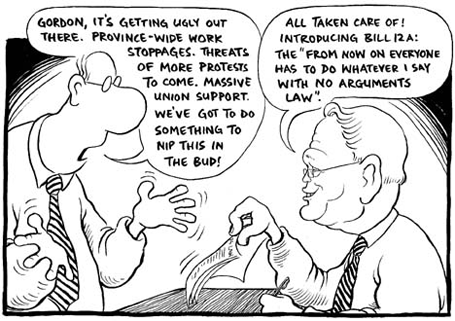
The Honourable Madam Justice B. Brown continued to baffle observers of industrial relations by announcing that her next ruling on penalties for the BCTF will be made at 11:00 AM on Friday, October 21st, a full week after her October 14th ruling which froze the union's strike fund and appointed a monitor. Most seasoned observers of industrial relations would argue that the court has provided a last chance to demonstrate remorse and initiate a return to work; however, as happened following her first ruling, there will be some who will argue that the court is sympathetic to the strike and is being soft. No court is soft when dealing with contempt.
The Campbell government is waiting for the big hammer to finally come down on Friday. The government has not yet learned how to exercise power and show graciousness to those whom it sees as opposing it. Teachers will ultimately be forced to return to work, more bitter than ever before. Professionalism will rule in the classroom but many will lose the will to participate in all the extra things that create school spirit. The problems created by large classes with unlimited numbers of special needs students will persist.
In his October 17th news conference, Premier Campbell said "If there are situations where there are 40 kids in a class, we want to know about that." Why would the Premier pick the example of 40 rather than of 32? The changes his government made to the School Act require that the district wide average for grade 4 to 12 not exceed 30. Was the Premier admitting that he knows how bad the problem is and only wants to hear about the most extreme examples?
Government's 'fact sheets'
The government has created a special website for publishing its response to the teachers' strike. The site contains a number of "fact sheets"; the one on special needs says:
"Is it true that teachers are having a hard time coping with a high number of ESL and special needs students in a classroom?"
"Every class, every school, every community is unique and has unique priorities. There is no magic number of students, or composition of students in a classroom."
"The composition of a class depends on who the students in the class are, who the teacher at the front of the class is, the additional resources that may be available to assist that teacher and the subject matter being taught."
"It's important that discussions around class composition take place at the school level and involve parents, teachers, principals and trustees - not just union and school district negotiators."
That position shows no understanding of what it is like to have a class of 32 students, four of whom have special needs. It is why teachers are angry, and why they don't trust the Campbell government to listen to their concerns.
In December 2004, Don Wright submitted his report on Teacher Collective Bargaining in which he wrote:
"The recognition of the value of providing more individualized instruction and the greater heterogeneity of the student body have made teaching more challenging for the committed teacher."
"For the classroom teacher, collective agreement language around class size, class composition and staffing ratios was how these challenges were being addressed. Furthermore, I would posit that this language represented, symbolically, recognition by society that teaching is a respected and challenging profession."
"The removal by legislation of the class size, class composition and staffing ratio provisions from the collective agreement has been taken by many teachers as a devaluation of their role in society - a sign of disrespect."
The Wright approach
Wright recommended that, rather than allow class size and composition to be part of collective bargaining, they should be part of a parallel process where "teachers' representatives make up roughly fifty percent of the participants". The round table announced by Education Ministry Shirley Bond failed to adopt Wright's recommendation. A government that consistently rejects advice from commissions it appoints is not likely to have credibility when it asks teachers to participate in processes following their strike.
Like all strikes, the teachers' strike will eventually end, in this case probably accompanied by crushing penalties, but the problems will linger. In the words of Don Wright: "The unresolved issues surrounding class size, composition and staffing ratios will have to be dealt with before a lasting, mature collective bargaining relationship can be achieved."
Vince Ready, appointed as an Industrial Inquiry Commission to recommend a new collective bargaining structure for teachers and school employers by December 31st, will no doubt reflect on that advice when he considers what type of structure can succeed without a change in the government's position.
Political analyst David Schreck publishes the online journal Strategic Thoughts where a version of this appeared. ![]()















Tyee Commenting Guidelines
Comments that violate guidelines risk being deleted, and violations may result in a temporary or permanent user ban. Maintain the spirit of good conversation to stay in the discussion.
*Please note The Tyee is not a forum for spreading misinformation about COVID-19, denying its existence or minimizing its risk to public health.
Do:
Do not: